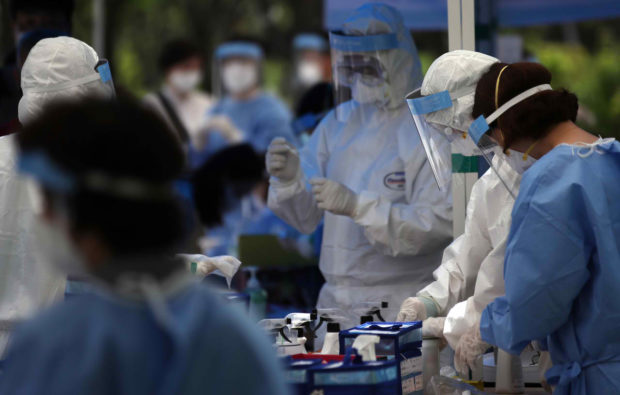SEOUL — South Korea plans to further enhance its steps aimed at preventing the spread of the new coronavirus, especially at those facilities considered high risk, the country’s health minister said Sunday, despite a steady decline in the number of new infection cases.
As of Sunday, the country had confirmed 27 additional cases of the new coronavirus, bringing its total caseload to 11,468, according to the Korea Centers for Disease Control and Prevention (KCDC).
It marks the first time in five days that the daily number of virus cases was below 30. It also marks a steady drop from a near two-month high of 79 cases reported Thursday, followed by 58 cases Friday and 39 Saturday.
Starting from Tuesday, however, those facilities considered high risk, including bars and karaoke rooms, will be required to keep a quick response (QR) code-based customer register, Health Minister Park Neung-hoo said in a press briefing.
The move comes after local health authorities struggled to locate thousands of visitors to nightspots in Seoul’s international district of Itaewon, to which 270 infection cases have so far been linked.
Park said the identity of visitors to high-risk facilities and their records of visit will be kept separately to prevent any possible leak of personal information and only be matched for identification when needed.
Also, the stored information will be automatically deleted after four weeks, he added.
The government earlier said it will inspect some 39,000 construction sites and manufacturing businesses throughout the country for infection risks after a distribution facility in Bucheon, just west of Seoul, emerged as the origin of a new cluster of infections in the capital region.
As of noon, 111 cases have been traced to the distribution center run by e-commerce leader Coupang, up three from the previous day, according to the KCDC. The first patient from the distribution center was confirmed on May 23.
The health minister said the government will check some 4,300 distribution and logistics centers throughout the nation to prevent any new cluster infections.
“The next one or two weeks will be crucial to breaking the chain of infections in the capital region,” Park said.
Still, the health minister said the latest wave of infection cases was not serious enough to reintroduce an all-out social distancing campaign.
Of the new cases reported Sunday, 15 were local infections while the remaining 12 came from other countries, according to the KCDC.
Seoul saw its infection cases rise by six to 861, while nearby Gyeonggi Province and Incheon had their totals increase by 12 and three, respectively, to 840 and 206.
Of the 12 new imported cases, half of them were from the Americas.
The country reported one additional death, bringing the total death toll at 270. The fatality rate was 2.35 percent.
The total number of people released from quarantine after full recoveries stood at 10,405, up seven from the previous day, with 793 people currently under treatment.
The resurgence in new virus cases in recent days has put South Korea’s “everyday life quarantine” scheme, which enables citizens to carry out social and economic activities under quarantine rules, in jeopardy.
There has been speculation that the country may return to its strict social distancing scheme. The country Thursday opted to impose tighter virus prevention measures in the capital and densely populated metropolitan area, which includes shutdowns of public facilities, over the next two weeks through June 14. Yonhap


